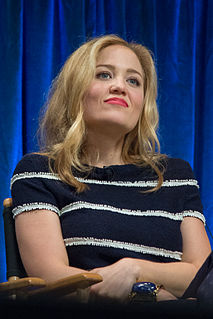Top 1068 Ethical Quotes & Sayings
Explore popular Ethical quotes.
Last updated on April 14, 2025.
My ethical naturalism sees us as facing the predicament of being social animals without evolved adaptations that make social life easy. The fundamental problem that sparks the ethical project lies in our limited responsiveness to one another. The only way we have to address that problem is through a representative, informed, and engaged conversation.
In trying to develop an impartial, expansive ethic we are trying to get ethical systems to do something which they did not evolve in order to do. This doesn't mean that it can't be done or that we shouldn't try to expand the reach of our ethical frameworks, only that there are reasons to be skeptical about its success.
What is the relationship between spirituality and ethical practice? Since love and compassion and similar qualities all, by definition, presume some level of concern for others' well-being, they presume ethical restraint. We cannot be loving and compassionate unless at the same time we curb our own harmful impulses and desires.
Man is appealed to be guided in his acts, not merely by love, which is always personal, or at best tribal, but by his perception of his oneness with each human being. In the practice of mutual aid, which we can re-trace to the earliest beginnings of evolution, we thus find the positive and undoubted origin of our ethical conceptions; and we can affirm that in the ethical progress of man, mutual support- not mutual struggle- has had the leading part.
(Because) the notion of absolute truth is difficult to sustain outside the context of religion, ethical conduct is not something we engage in because it is somehow right in itself but because, like ourselves, all others desire to be happy and to avoid suffering. Given that this is a natural disposition, shared by all, it follows that each individual has a right to pursue this goal. Accordingly, I suggest that one of the things which determines whether an act is ethical or not is its effect on others' experience or expectation of happiness.
The ethical system of these men of the New Republic, the ethical system which will dominate the world state, will be shaped primarily to favour the procreation of what is fine and efficient and beautiful in humanity — beautiful and strong bodies, clear and powerful minds, and a growing body of knowledge — and to check the procreation of base and servile types, of fear-driven and cowardly souls, of all that is mean and ugly and bestial in the souls, bodies, or habits of men.
It's tempting to think that decisions that are not life-and-death are therefore unimportant, and that the little compromises we make don't matter to our bottom line or our spiritual selves. How many of us are tempted, in business, to make a less-than-ethical decision? To appropriate someone else's idea or fudge some numbers? We have to remember that maintaining our ethical and spiritual selves is absolutely linked with achieving the degree of success we're working toward.
Talking about freedom, about ethical issues, about responsibilities as well as convenience, is asking people to think about things they might prefer to ignore, such as whether their conduct is ethical. This can trigger discomfort, and some people may simply close their minds to it. It does not follow that we ought to stop talking about these things.
Unfortunately for ethical egoism, the claim that we will all be better off if every one of us does what is in his or her own interest is incorrect. This is shown by what are known as "prisoner's dilemma" situations, which are playing an increasingly important role in discussions of ethical theory... At least on the collective level, therefore, egoism is self-defeating - a conclusion well brought out by Parfit in his aforementioned Reasons and Persons.
I am, I must confess, suspicious of those who denounce others for having too much sex. At what point does a healthy amount become too much? There are, of course, those who suffer because their desire for sex has become compulsive; in their case the drive (loneliness, guilt) is at fault, not the activity as such. When morality is discussed I invariably discover, halfway into the conversation, that what is meant are not the great ethical questions but the rather dreary business of sexual habit, which to my mind is an aesthetic rather than an ethical issue.
We live in a world full of accidents finally in which on aesthetic principles have a consistency of which we can be sure. Right and wrong we will struggle with forever striving to create and maintain an ethical balance. Right and wrong we will struggle with forever, striving to create and maintain an ethical balance; but the shimmer of summer rain under the street lamps or the great flashing glare of artillery against a night sky – such brutal beauty is beyond dispute.
Civilization can only revive when there shall come into being in a number of individuals a new tone of mind, independent of the prevalent one among the crowds, and in opposition to it - a tone of mind which will gradually win influence over the collective one, and in the end determine its character. Only an ethical movement can rescue us from barbarism, and the ethical comes into existence only in individuals.
Positively, he [Heidegger] shows that the prospect of death doesn't of itself destroy all possibilities of meaning but calls instead for these to be relocated from fantasies about a future post-mortem life. However, I don't think he does enough in this work to show that this relocation has - I believe - a primarily ethical character (in Levinas's sense of 'ethical').
Experience was of no ethical value. It was merely the name men gave to their mistakes. Moralists had, as a rule, regarded it as a mode of warning, had claimed for it a certain ethical efficacy in the formation of character, had praised it as something that taught us what to follow and showed us what to avoid. But there was no motive power in experience. It was as little of an active cause as conscience itself. All that it really demonstrated was that our future would be the same as our past, and that the sin we had done once, and with loathing, we would do many times, and with joy.
You still owe me a million dollars." I'd presented him with a bill for proving his innocence and getting him freed from prison. He had yet to pay. Couldn't imagine why. "Yeah, I was hoping we could work that out." "The interest alone is going to kill you." "What do you charge?" "Three hundred eighty-seven percent." "Is that ethical?" "It's as ethical as my dating the son of Satan.
It cannot be denied that Islam, regarded as an ethical ideal plus a certain kind of polity - by which expression I mean a social structure regulated by a legal system and animated by a specific ethical ideal - has been the chief formative factor in the life-history of the Muslims of India. It has furnished those basic emotions and loyalties which gradually unify scattered individuals and groups, and finally transform them into a well-defined people, possessing a moral consciousness of their own.
Ethical veganism results in a profound revolution within the individual; a complete rejection of the paradigm of oppression and violence that she has been taught from childhood to accept as the natural order. It changes her life and the lives of those with whom she shares this vision of nonviolence. Ethical veganism is anything but passive; on the contrary, it is the active refusal to cooperate with injustice
Pay attention to the voice within. . . . Sometimes the voice of your conscience gets drowned out by crowd noise or by the pep rally of temptations. And your mind may put some selfish spin on the ball, rationalizing that it's okay to veer away from the ethical route. When we run into conflicts between ethical "shoulds" and our selfish "wants," we all argure out ways to con our conscience. But take pains to listen, because it has your best interests at heart.
There's a floating distraction in the contemporary world, life at a distance enabled by technology. I want people to commit at the level of their subjectivity. The idea of subjective commitment is at the core of ethics, something that divides the self from itself. I become an ethical self. I cannot meet that ideal, I cannot fulfill it, it divides me from myself and it makes me strive harder. This ideal subjective ethical drive is at the heart of an absolutely earnest, radical politics that insists that people will be able to engage with each other, and they're lifted from irony at that point.
Here is my challenge. Name one ethical statement made, or one ethical action performed, by a believer that could not have been uttered or done by a nonbeliever. And here is my second challenge. Can any reader think of a wicked statement made, or an evil action performed, precisely because of religious faith? The second question is easy to answer, is it not? The first - I have been asking it for some time - awaits a convincing reply. By what right, then, do the faithful assume this irritating mantle of righteousness? They have as much to apologize for as to explain.
Individualism is at once an ethical-psychological concept and an ethical-political one. As an ethical-psychological concept, individualism holds that a human being should think and judge independently, respecting nothing more than the sovereignty of his or her mind; thus, it is intimately connected with the concept of autonomy. As an ethical-political concept, individualism upholds the supremacy of individual rights
The meaning that we are seeking in evolution is its meaning to us, to man. The ethics of evolution must be human ethics. It is one of the many unique qualities of man, the new sort of animal, that he is the only ethical animal. The ethical need and its fulfillment are also products of evolution, but they have been produced in man alone.
In separating out, say, legal and moral requirements, I tend to work with paradigms rather than strict divisions - eg, paradigmatically, legal requirements are jurisdictionally bound whereas ethical requirements are aspirationally universal; ethical requirements focus especially on intentions whereas legal requirements focus primarily on conduct; ethical requirements take priority over legal requirements; and so on.
The great masquerade of evil has played havoc with all our ethical concepts. For evil to appear disguised as light, charity, historical necessity, or social justice is quite bewildering to anyone brought up on our traditional ethical concepts, while for the Christian who bases his life on the Bible, it merely confirms the fundamental wickedness of evil.
Art itself is essentially ethical; because every true work of art must have a beauty or grandeur of some kind, and beauty and grandeur cannot be comprehended by the beholder except through the moral sentiment. The eye is only a witness; it is not a judge. The mind judges what the eye reports to it; therefore, whatever elevates the moral sentiment to the contemplation of beauty and grandeur is in itself ethical.
The various roles we incorporate into the criminal justice system as well as the ways in which we construe such roles, lend themselves to the kind of ethical reflection that is open to us all. That said, once we have determined roles and their contours, those who act within them may have special duties and privileges that others may lack. Specific roles may generate ethical inquiries with novel forms, just as new technologies may push us in new directions.
I believe, indeed, that overemphasis on the purely intellectual attitude, often directed solely to the practical and factual, in our education, has led directly to the impairment of ethical values. I am not thinking so much of the dangers with which technical progress has directly confronted mankind, as of the stifling of mutual human considerations by a 'matter-of-fact' habit of thought which has come to lie like a killing frost upon human relations. Without 'ethical culture' there is no salvation for humanity.




















































